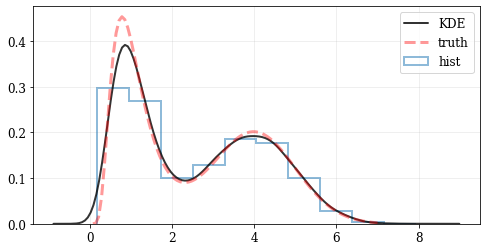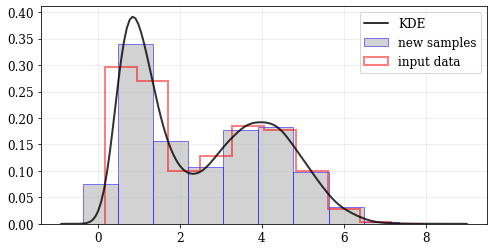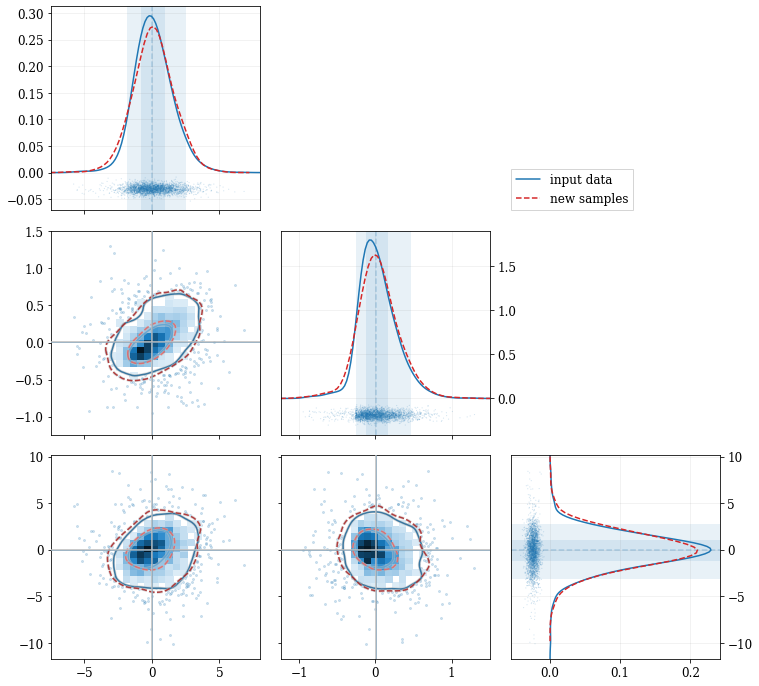Introduction
Multidimensional kernel density estimation for distribution functions, resampling, and plotting.

Installation
pip install kalepy
or from source, for development:
git clone https://github.com/lzkelley/kalepy.git
pip install -e kalepy
Quickstart
One dimensional kernel density estimation:
import kalepy as kale
import matplotlib.pyplot as plt
points, density = kale.density(data, points=None)
plt.plot(points, density, 'k-', lw=2.0, alpha=0.8, label='KDE')

One dimensional resampling:
# Draw new samples from the KDE reconstructed PDF
samples = kale.resample(data)
plt.hist(samples, density=True, alpha=0.5, label='new samples', color='0.65', edgecolor='b')

Multi-dimensional kernel density estimation:
# Construct a KDE instance from data, shaped (N, 3) for `N` data points, and 3 dimensions
kde = kale.KDE(data)
# Build a corner plot using the `kalepy` plotting submodule
corner = kale.corner(kde)

Documentation
A number of examples are included in the package notebooks, and the readme file. Some background information and references are included in the JOSS paper.
Development & Contributions
Please visit the github page to make contributions to the package. Particularly if you encounter any difficulties or bugs in the code, please submit an issue, which can also be used to ask questions about usage, or to submit general suggestions and feature requests. Direct additions, fixes, or other contributions are very welcome which can be done by submitting pull requests. If you are considering making a contribution / pull-request, please open an issue first to make sure it won’t clash with other changes in development or planned for the future. Some known issues and indended future-updates are noted in the change-log file. If you are looking for ideas of where to contribute, this would be a good place to start.
Updates and changes to the newest version of kalepy will not always be backwards compatible. The package is consistently versioned, however, to ensure that functionality and compatibility can be maintained for dependencies. Please consult the change-log for summaries of recent changes.
Test Suite
If you are making, or considering making, changes to the kalepy source code, the are a large number of built in continuous-integration tests, both in the kalepy/tests directory, and in the kalepy notebooks. Many of the notebooks are automatically converted into test scripts, and run during continuous integration. If you are working on a local copy of kalepy, you can run the tests using the tester.sh script (i.e. ‘$ bash tester.sh’), which will include the test notebooks.
Attribution
A JOSS paper has been published on the kalepy package. If you have found this package useful in your research, please add a reference to the code paper:
@article{Kelley2021,
doi = {10.21105/joss.02784},
url = {https://doi.org/10.21105/joss.02784},
year = {2021},
publisher = {The Open Journal},
volume = {6},
number = {57},
pages = {2784},
author = {Luke Zoltan Kelley},
title = {kalepy: a Python package for kernel density estimation, sampling and plotting},
journal = {Journal of Open Source Software}
}